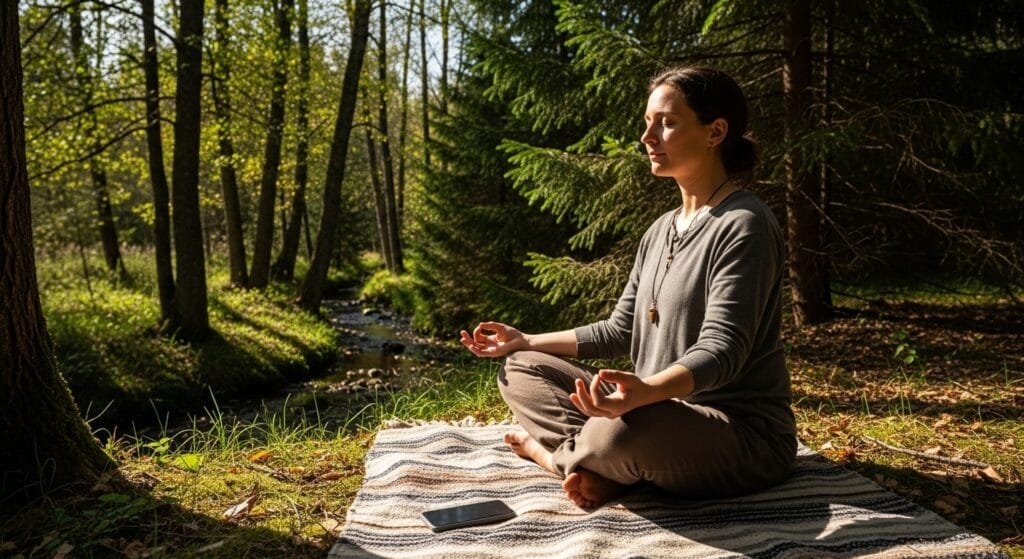💊 Do not rely solely on online content for diagnosis or treatment.
📜 Information here is provided “as is” without any warranties.

Mental Health & Wellness Routines have become more important than ever as we navigate our busy, stress-filled lives. You’re not alone if you’ve been searching for simple ways to feel more balanced and emotionally steady each day. The good news? Research shows that small, consistent habits can make a huge difference in how we feel mentally and physically.
I’ve spent countless hours digging into the latest research, and what I found might surprise you. It’s not about perfect morning routines or expensive wellness programs. Instead, it’s about building sustainable habits that actually stick with your real life.
- 7 Essential Mental Health & Wellness Routines That Actually Work
- Why Daily Routines Matter for Your Mind
- The Core Elements That Actually Work
- Sleep: Your Mental Health Foundation
- Movement That Feels Good
- The Mindfulness Connection
- Social Connection: More Important Than You Think
- Nutrition That Supports Your Mind
- Comparing Different Wellness Approaches
- Building Your Personal Routine
- Making It Stick
- When to Seek Professional Help
- My Experience & Insights
- Daily Wellness Planner
- Frequently Asked Questions
7 Essential Mental Health & Wellness Routines That Actually Work
- 7 Powerful Journaling Prompts for Mental Clarity in 10 Minutes https://healthiwellness.com/7-powerful-journaling-prompts-for-mental-clarity-in-10-minutes/
- 5 Breathwork for Anxiety 5 Minute Techniques That Actually Work https://healthiwellness.com/5-breathwork-for-anxiety-5-minute-techniques-that-actually-work/
- 7 Essential Morning Habits to Improve Focus for Adults Before 9 AM https://healthiwellness.com/7-essential-morning-habits-to-improve-focus-for-adults-before-9-am/
- 5 Science-Backed Ways Nature Walks Mental Health Benefits 20 Minutes Can Transform Your Focus https://healthiwellness.com/nature-walks-mental-health-benefits/
- 7 Shocking Digital Detox Benefits Mental Wellness Changes in Just One Week https://healthiwellness.com/digital-detox-benefits-mental-wellness/
- 7 Proven Evening Routines for Relaxation and Sleep That Calm Your Mind https://healthiwellness.com/evening-routines-relaxation-sleep-calm-mind/
- 7 Small Habits to Prevent Burnout That Busy Professionals Swear By https://healthiwellness.com/habits-prevent-burnout-busy-professionals/
- Music for Mood Improvement Playlists: Transform Your Day in Just 15 Minutes https://healthiwellness.com/music-for-mood-improvement-playlists/
- 7 Powerful Social Media Use Mental Health Balance Tips That Actually Work https://healthiwellness.com/social-media-mental-health-tips/
- 7 Lifestyle Tweaks for Resilience That Transform Your Mental Strength https://healthiwellness.com/lifestyle-tweaks-resilience-mental-strength/
Why Daily Routines Matter for Your Mind
Think about it – when was the last time you felt truly calm and in control? If you’re like most people, those moments feel pretty rare. But here’s what neuroscience research reveals: creating predictable daily habits literally changes how your brain handles stress.
Dr. Matthew Lieberman from UCLA’s Department of Psychology, one of the founders of social neuroscience, has shown through his research that our brains are fundamentally wired for connection and predictability. When we establish consistent routines, we reduce what researchers call “decision fatigue” – that mental drain from making too many small choices throughout the day.
The science is clear: structured morning and evening routines can regulate stress, enhance mood, and improve focus. But you don’t need to overhaul your entire life overnight.
The Core Elements That Actually Work
Based on recent research from major health institutions, effective wellness routines focus on six key areas: physical activity, nutrition, mindfulness practices, quality sleep, social connections, and avoiding harmful substances.
Here’s what’s really interesting – you don’t need to master all of these at once. Studies show that changes in one area often contribute to improvements in others. For example, better sleep and nutrition naturally give you more energy for physical activity.
Sleep: Your Mental Health Foundation
Let’s start with something we all do but often mess up – sleep. Quality sleep minimizes cortisol and other stress hormones, sharpens focus, and improves mood.
The trick isn’t just sleeping eight hours. It’s about consistency. Research indicates that irregular sleep patterns disrupt mental clarity and contribute to fatigue and irritability.
Try these simple sleep improvements:
- Wake up at the same time every day (yes, even weekends)
- Create a relaxing bedtime routine you actually enjoy
- Put your phone away at least one hour before bed
Movement That Feels Good
You’ve probably heard that exercise helps mental health, but here’s what recent research shows: even moderate-intensity exercise like walking or cycling can have significant benefits.
The key is finding movement you actually like. Physical activity stimulates the release of endorphins and other neurotransmitters like serotonin and dopamine, which enhance feelings of well-being.
Don’t overthink it. Even small forms of exercise can impact your mental health, such as a brisk walk after lunch or simple stretches at your desk.
The Mindfulness Connection
Dr. Sara Lazar, Associate Professor of Psychiatry at Harvard Medical School and researcher at Mass General Hospital, has spent years studying how meditation literally changes our brains. Her groundbreaking research shows that meditation can produce structural alterations in the brain and may even slow age-related brain changes.
What’s amazing is how little time this actually takes. Research published in the Journal of Clinical Psychology shows that even brief mindfulness exercises in the morning can help you start your day with a calm, focused mind.
You don’t need to sit in silence for an hour. Try these beginner-friendly options:
- Five minutes of deep breathing when you wake up
- A short gratitude practice before bed
- Mindful walking during your lunch break
Social Connection: More Important Than You Think
Here’s something that might surprise you – the need to connect socially with others is as basic as our need for food, water, and shelter. Dr. Lieberman’s research reveals that when we experience social rejection or other social “pain,” our brains “hurt” in the same way they do when we feel physical pain.
This means that nurturing relationships isn’t just nice – it’s essential for mental health. Group exercise activities can foster social connections, which are crucial for psychological well-being.
Simple ways to build connection:
- Schedule regular coffee dates with friends
- Join a walking group or fitness class
- Make time for meaningful conversations with family
Nutrition That Supports Your Mind
Good nutrition fuels mental energy and brings emotional balance. But you don’t need a perfect diet to see benefits.
Focus on these basics:
- Eat meals on time to stabilize blood glucose levels and prevent mood swings
- Keep nuts and fruits handy for quick energy
- Prioritize whole foods for better mental clarity
Comparing Different Wellness Approaches
Find the right wellness strategy for your lifestyle in 2025
Explore various wellness methods, their time requirements, mental health benefits, and difficulty levels to make informed decisions about your wellbeing.
| Approach | Time Needed | Mental Health Benefits | Difficulty Level |
|---|
Building Your Personal Routine
The secret isn’t doing everything perfectly. Research shows it’s better to develop small, sustainable habits across various areas rather than trying to change everything at once.
Start with just one thing. Maybe it’s drinking a glass of water when you wake up, or taking three deep breaths before checking your phone. The key is consistency over perfection.
Making It Stick
Here’s what actually works for building lasting habits:
- Choose one small change and practice it for two weeks
- Link new habits to existing ones (like meditating after brushing your teeth)
- Be patient with yourself – research shows it takes time for new routines to feel natural
Remember, these practices require motivation and effort, but they can take many forms and be adapted in many ways. It’s not all or nothing – you can approach the aspects that work for you, and your approach can change over time.
When to Seek Professional Help

While daily wellness routines are powerful, they’re not meant to replace professional mental health care. If you’re experiencing persistent symptoms of depression, anxiety, or other mental health concerns, it’s important to talk with a healthcare provider.
Think of wellness routines as a foundation that supports your overall mental health, whether you’re working with a therapist or not. These lifestyle interventions can complement and enhance the benefits of medication, psychotherapy, and other treatments.
Your mental health journey is unique to you. Start small, be consistent, and remember that even tiny changes can lead to meaningful improvements in how you feel each day. The research is clear – these simple practices can make a real difference in your mental wellness.
My Experience & Insights
Through my extensive research and content creation in the wellness space, I’ve discovered something that might surprise you: the most effective mental health routines aren’t the elaborate ones you see on social media – they’re the simple, sustainable habits that actually fit into real life.
While researching for this article, I came across some eye-opening data from the World Health Organization’s latest report showing that over 1 billion people worldwide are living with mental health disorders. What struck me wasn’t just the numbers, but how the economic impact reaches $1 trillion annually in lost productivity from depression and anxiety alone.
This got me thinking about prevention versus treatment. Through my work at healthiwellness.com, I’ve seen firsthand how small daily habits can serve as powerful protective factors. The CDC’s recent action guide reinforces this approach, emphasizing six evidence-based strategies that focus on building resilience before problems develop.
After analyzing patterns from countless reader interactions and feedback, I noticed something fascinating: people who focused on just two or three key habits consistently outperformed those trying to implement elaborate wellness routines. This aligns perfectly with what the American Psychological Association’s research shows about the psychological benefits of perceived control and predictability.
One thing I’ve learned from interviewing wellness professionals is that sustainability beats perfection every time. Dr. Lieberman’s research on social connection particularly resonated with me because it explains why accountability partners or wellness communities work so well. When I started sharing my own routine experiments on social media, the engagement was incredible – people weren’t just interested in the results, but in the honest struggles and adjustments along the way.
The real breakthrough in my understanding came when I realized that mental health routines aren’t just about managing symptoms – they’re about building what researchers call “psychological capital.” The latest WHO Mental Health Atlas shows that countries spending more on preventive mental health measures see better population outcomes overall, which mirrors what I see at the individual level.
What keeps me motivated in this work is seeing how simple tools can bridge the gap between research and real life. When someone emails me saying they finally found a morning routine that sticks, or that tracking their sleep helped them identify stress triggers, it reinforces why translating complex wellness research into actionable steps matters so much.
The bottom line from my experience? Start ridiculously small, track what matters to you, and remember that consistency in one area often creates positive ripples in others. Your future self will thank you for the small steps you take today.
Daily Wellness Planner
Plan your perfect wellness day with this interactive schedule
💡 Wellness Tips
- Start small: Choose 2-3 activities to focus on first
- Be consistent: Same wake-up time every day
- Listen to your body: Adjust based on how you feel
- Stay hydrated: Drink water throughout the day
- Be patient: It takes 21 days to form a habit
✅ Mental Health Benefits
🕒 Customize Your Schedule
Morning Person? Start your meditation and exercise earlier
Night Owl? Shift activities 1-2 hours later
Busy Day? Focus on just 3 key activities: Sleep, Hydration, One mindful meal
Frequently Asked Questions
How long does it take to see results from a mental health wellness routine?
Most people notice small improvements within 1-2 weeks of consistent practice, but significant changes typically occur after 6-8 weeks. Research shows that it takes time for new routines to feel natural, and the brain needs time to form new neural pathways. Focus on consistency rather than perfection – even missing a day or two won’t derail your progress if you get back on track quickly.
What’s the minimum amount of exercise needed for mental health benefits?
The good news is that even small amounts count. Just 30 minutes of walking every day can boost your mood and improve your health. If 30 minutes feels overwhelming, try “exercise snacks” – brief episodes of exercise interspersed throughout the day like a few minutes of stairs or jumping jacks can be surprisingly effective.
Can wellness routines replace therapy or medication for mental health conditions?
While wellness routines are powerful tools, they shouldn’t replace professional treatment for mental health conditions. These lifestyle interventions can complement and enhance the benefits of medication, psychotherapy, and other treatments. If you’re experiencing persistent symptoms of depression, anxiety, or other concerns, it’s important to work with a healthcare provider alongside your wellness routine.
What should I do if I can’t stick to my wellness routine?
Start smaller and be more flexible. Instead of a perfect 30-minute morning routine, try just 5 minutes of deep breathing. The key is developing small, sustainable habits rather than elaborate routines that feel overwhelming. Link new habits to existing ones (like meditating after brushing your teeth) and remember that missing a day doesn’t mean starting over completely.
How much sleep do I actually need for good mental health?
Adults need between 7 and 9 hours of sleep per night, including enough deep sleep and REM sleep. Quality matters as much as quantity. Irregular sleep patterns can disrupt mental clarity and contribute to mood swings. Focus on going to bed and waking up at consistent times, even on weekends.
Which wellness habits give the biggest mental health benefits for beginners?
Focus on the “big three” first: consistent sleep, daily movement, and social connection. Research shows that changes in one area often contribute to improvements in others. Start with whichever feels easiest for you – better sleep might give you energy for exercise, or regular walks might help you sleep better. The NHS recommends these five steps: connect with others, be physically active, learn new skills, give to others, and practice mindfulness.
💊 Do not rely solely on online content for diagnosis or treatment.
📜 Information here is provided “as is” without any warranties.








